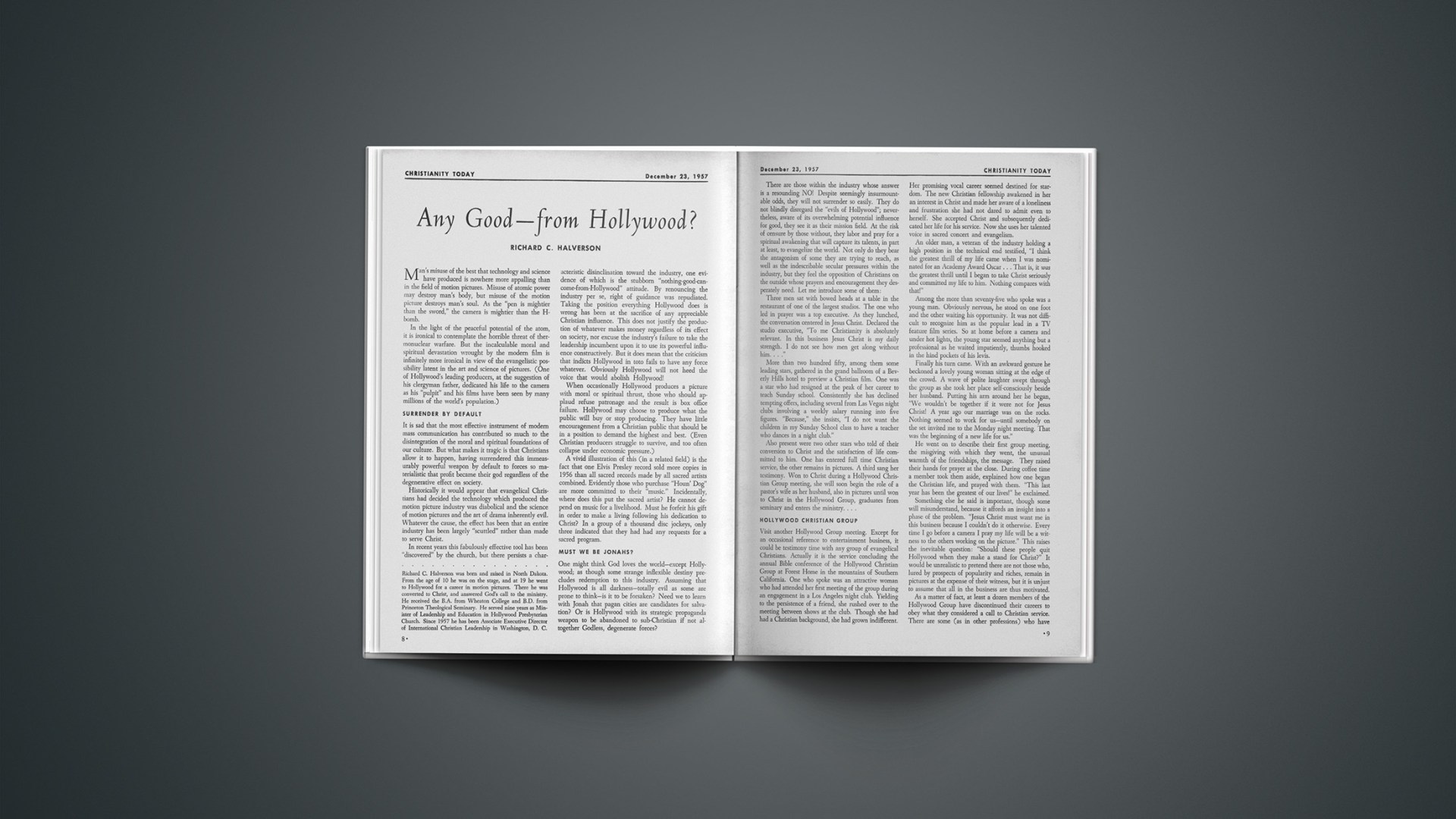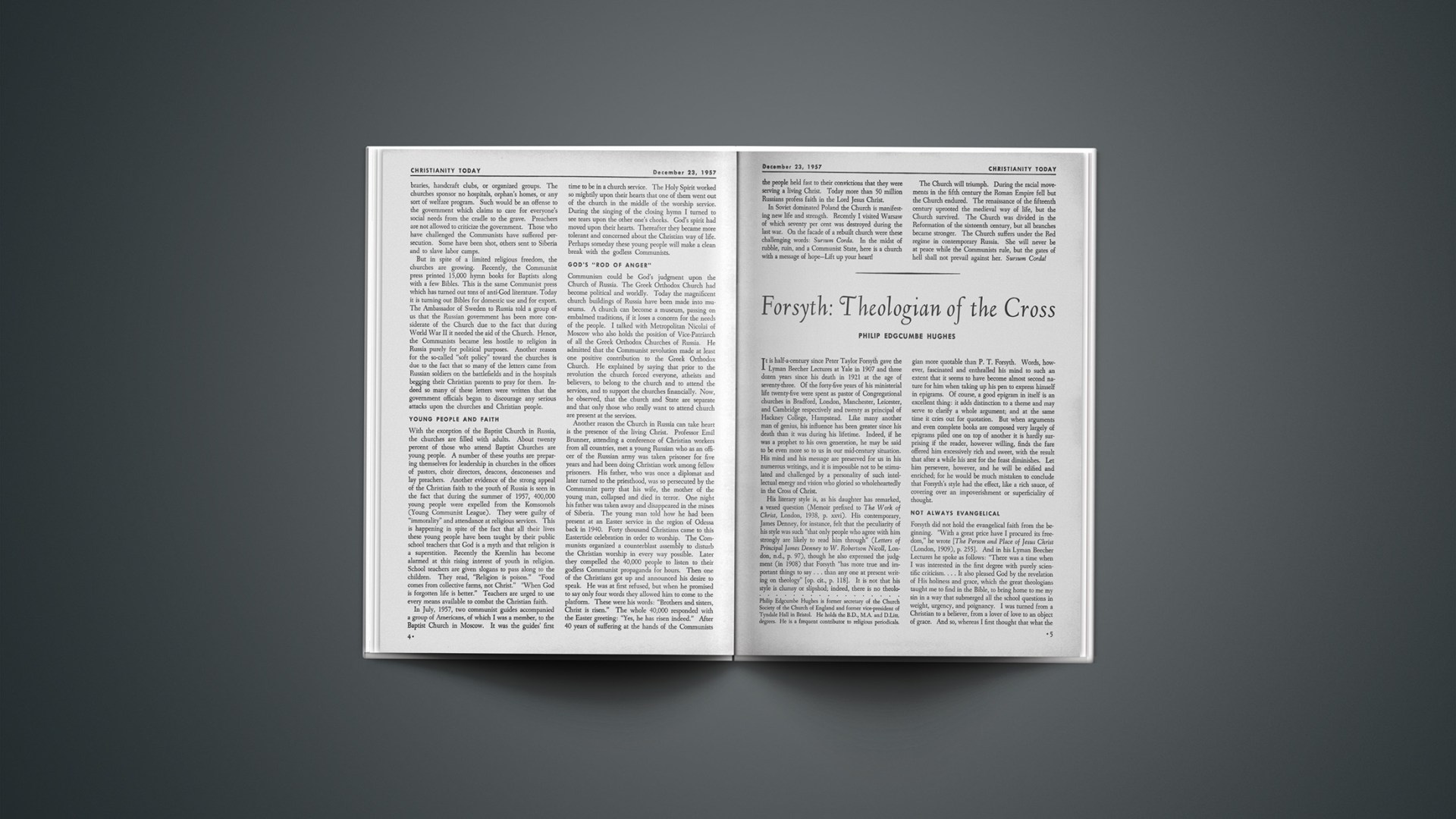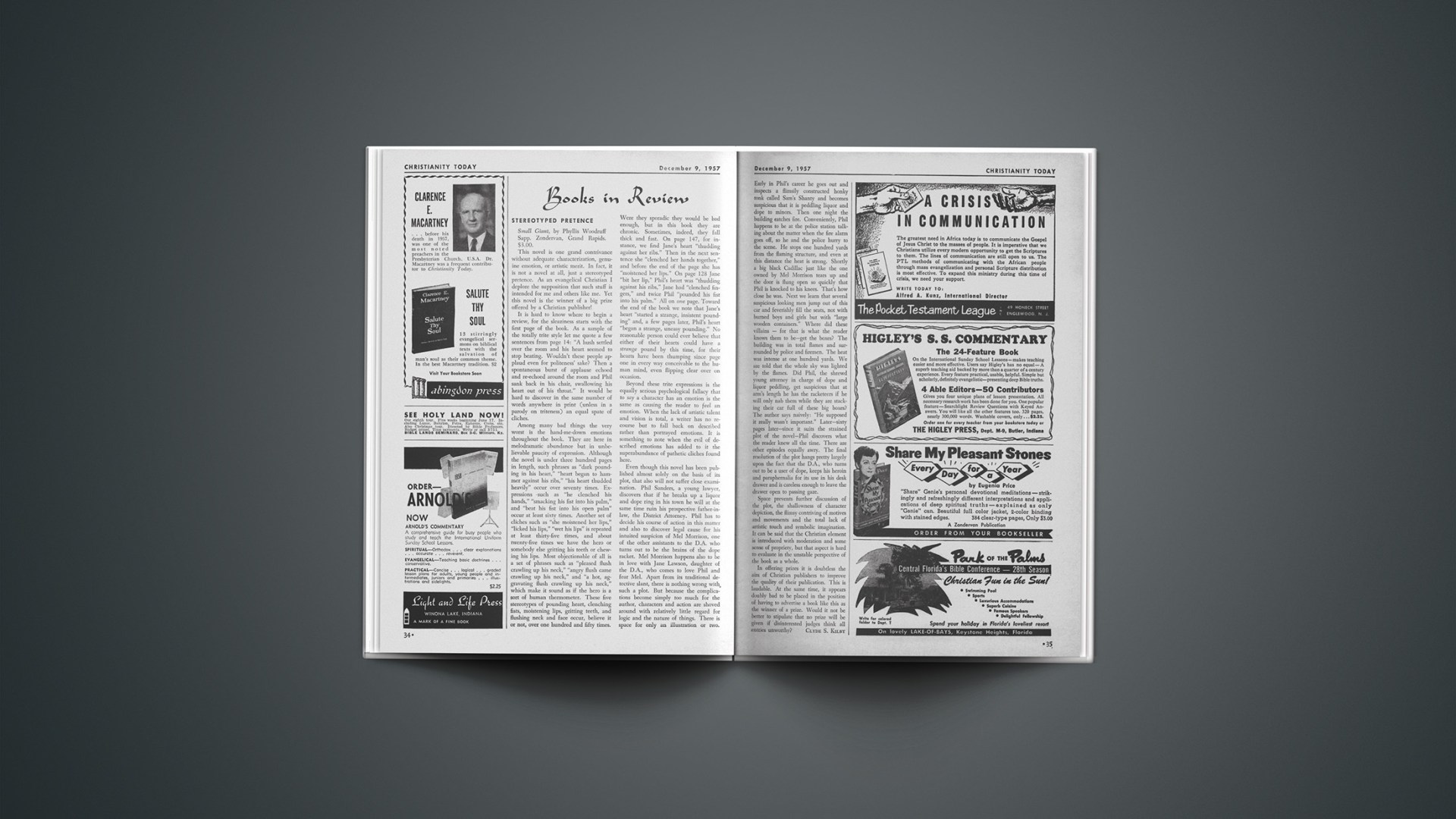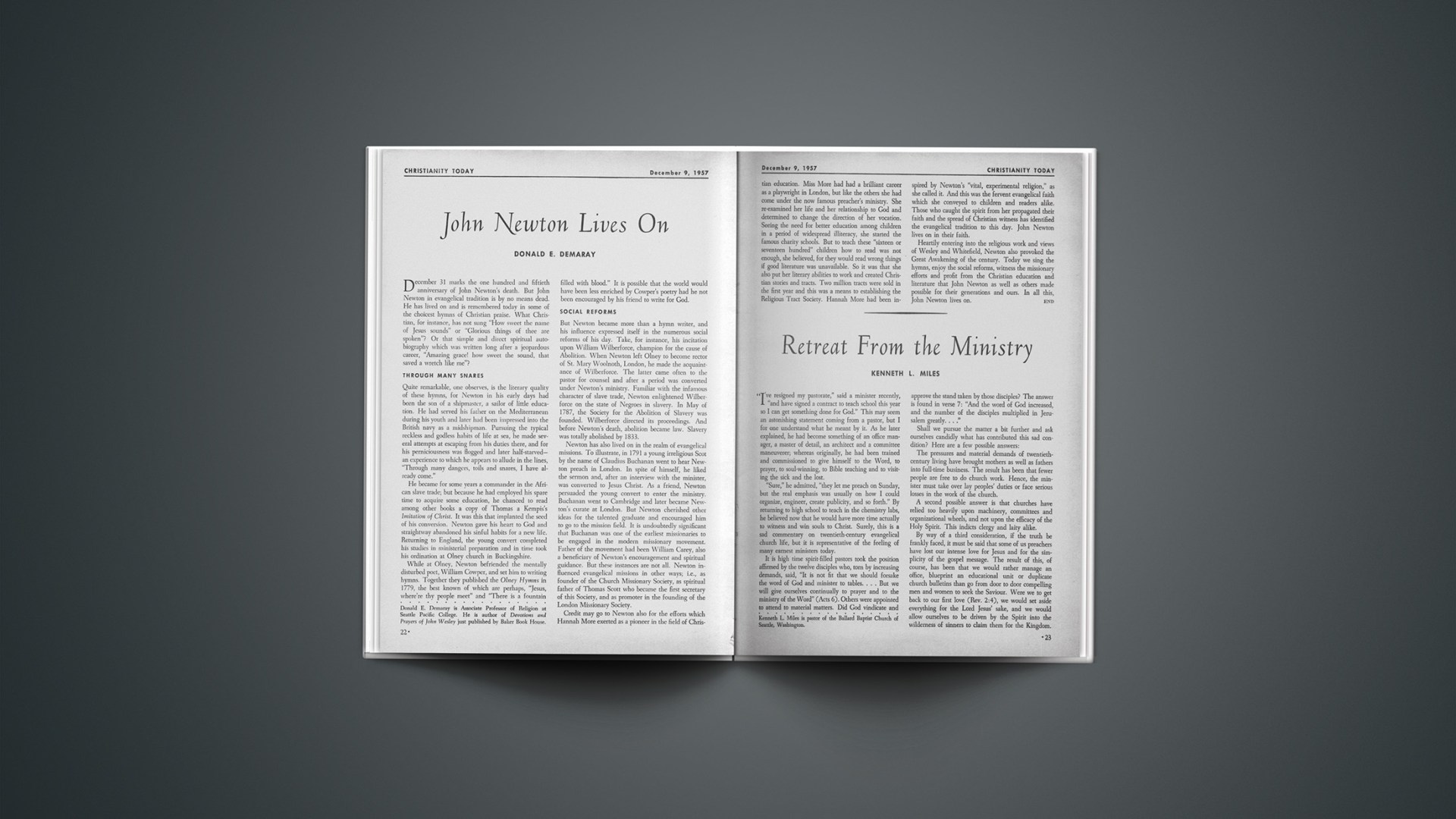Man’s misuse of the best that technology and science have produced is nowhere more appalling than in the field of motion pictures. Misuse of atomic power may destroy man’s body, but misuse of the motion picture destroys man’s soul. As the “pen is mightier than the sword,” the camera is mightier than the H-bomb.
In the light of the peaceful potential of the atom, it is ironical to contemplate the horrible threat of thermonuclear warfare. But the incalculable moral and spiritual devastation wrought by the modern film is infinitely more ironical in view of the evangelistic possibility latent in the art and science of pictures. (One of Hollywood’s leading producers, at the suggestion of his clergyman father, dedicated his life to the camera as his “pulpit” and his films have been seen by many millions of the world’s population.)
Surrender By Default
It is sad that the most effective instrument of modern mass communication has contributed so much to the disintegration of the moral and spiritual foundations of our culture. But what makes it tragic is that Christians allow it to happen, having surrendered this immeasurably powerful weapon by default to forces so materialistic that profit became their god regardless of the degenerative effect on society.
Historically it would appear that evangelical Christians had decided the technology which produced the motion picture industry was diabolical and the science of motion pictures and the art of drama inherently evil. Whatever the cause, the effect has been that an entire industry has been largely “scuttled” rather than made to serve Christ.
In recent years this fabulously effective tool has been “discovered” by the church, but there persists a characteristic disinclination toward the industry, one evidence of which is the stubborn “nothing-good-can-come-from-Hollywood” attitude. By renouncing the industry per se, right of guidance was repudiated. Taking the position everything Hollywood does is wrong has been at the sacrifice of any appreciable Christian influence. This does not justify the production of whatever makes money regardless of its effect on society, nor excuse the industry’s failure to take the leadership incumbent upon it to use its powerful influence constructively. But it does mean that the criticism that indicts Hollywood in toto fails to have any force whatever. Obviously Hollywood will not heed the voice that would abolish Hollywood!
When occasionally Hollywood produces a picture with moral or spiritual thrust, those who should applaud refuse patronage and the result is box office failure. Hollywood may choose to produce what the public will buy or stop producing. They have little encouragement from a Christian public that should be in a position to demand the highest and best. (Even Christian producers struggle to survive, and too often collapse under economic pressure.)
A vivid illustration of this (in a related field) is the fact that one Elvis Presley record sold more copies in 1956 than all sacred records made by all sacred artists combined. Evidently those who purchase “Houn’ Dog” are more committed to their “music.” Incidentally, where does this put the sacred artist? He cannot depend on music for a livelihood. Must he forfeit his gift in order to make a living following his dedication to Christ? In a group of a thousand disc jockeys, only three indicated that they had had any requests for a sacred program.
Must We Be Jonahs?
One might think God loves the world—except Hollywood; as though some strange inflexible destiny precludes redemption to this industry. Assuming that Hollywood is all darkness—totally evil as some are prone to think—is it to be forsaken? Need we to learn with Jonah that pagan cities are candidates for salvation? Or is Hollywood with its strategic propaganda weapon to be abandoned to sub-Christian if not altogether Godless, degenerate forces?
There are those within the industry whose answer is a resounding NO! Despite seemingly insurmountable odds, they will not surrender so easily. They do not blindly disregard the “evils of Hollywood”; nevertheless, aware of its overwhelming potential influence for good, they see it as their mission field. At the risk of censure by those without, they labor and pray for a spiritual awakening that will capture its talents, in part at least, to evangelize the world. Not only do they bear the antagonism of some they are trying to reach, as well as the indescribable secular pressures within the industry, but they feel the opposition of Christians on the outside whose prayers and encouragement they desperately need. Let me introduce some of them:
Three men sat with bowed heads at a table in the restaurant of one of the largest studios. The one who led in prayer was a top executive. As they lunched, the conversation centered in Jesus Christ. Declared the studio executive, “To me Christianity is absolutely relevant. In this business Jesus Christ is my daily strength. I do not see how men get along without him.…”
More than two hundred fifty, among them some leading stars, gathered in the grand ballroom of a Beverly Hills hotel to preview a Christian film. One was a star who had resigned at the peak of her career to teach Sunday school. Consistently she has declined tempting offers, including several from Las Vegas night clubs involving a weekly salary running into five figures. “Because,” she insists, “I do not want the children in my Sunday School class to have a teacher who dances in a night club.”
Also present were two other stars who told of their conversion to Christ and the satisfaction of life committed to him. One has entered full time Christian service, the other remains in pictures. A third sang her testimony. Won to Christ during a Hollywood Christian Group meeting, she will soon begin the role of a pastor’s wife as her husband, also in pictures until won to Christ in the Hollywood Group, graduates from seminary and enters the ministry.…
Hollywood Christian Group
Visit another Hollywood Group meeting. Except for an occasional reference to entertainment business, it could be testimony time with any group of evangelical Christians. Actually it is the service concluding the annual Bible conference of the Hollywood Christian Group at Forest Home in the mountains of Southern California. One who spoke was an attractive woman who had attended her first meeting of the group during an engagement in a Los Angeles night club. Yielding to the persistence of a friend, she rushed over to the meeting between shows at the club. Though she had had a Christian background, she had grown indifferent. Her promising vocal career seemed destined for stardom. The new Christian fellowship awakened in her an interest in Christ and made her aware of a loneliness and frustration she had not dared to admit even to herself. She accepted Christ and subsequently dedicated her life for his service. Now she uses her talented voice in sacred concert and evangelism.
An older man, a veteran of the industry holding a high position in the technical end testified, “I think the greatest thrill of my life came when I was nominated for an Academy Award Oscar … That is, it was the greatest thrill until I began to take Christ seriously and committed my life to him. Nothing compares with that!”
Among the more than seventy-five who spoke was a young man. Obviously nervous, he stood on one foot and the other waiting his opportunity. It was not difficult to recognize him as the popular lead in a TV feature film series. So at home before a camera and under hot lights, the young star seemed anything but a professional as he waited impatiently, thumbs hooked in the hind pockets of his levis.
Finally his turn came. With an awkward gesture he beckoned a lovely young woman sitting at the edge of the crowd. A wave of polite laughter swept through the group as she took her place self-consciously beside her husband. Putting his arm around her he began, “We wouldn’t be together if it were not for Jesus Christ! A year ago our marriage was on the rocks. Nothing seemed to work for us—until somebody on the set invited me to the Monday night meeting. That was the beginning of a new life for us.”
He went on to describe their first group meeting, the misgiving with which they went, the unusual warmth of the friendships, the message. They raised their hands for prayer at the close. During coffee time a member took them aside, explained how one began the Christian life, and prayed with them. “This last year has been the greatest of our lives!” he exclaimed.
Something else he said is important, though some will misunderstand, because it affords an insight into a phase of the problem. “Jesus Christ must want me in this business because I couldn’t do it otherwise. Every time I go before a camera I pray my life will be a witness to the others working on the picture.” This raises the inevitable question: “Should these people quit Hollywood when they make a stand for Christ?” It would be unrealistic to pretend there are not those who, lured by prospects of popularity and riches, remain in pictures at the expense of their witness, but it is unjust to assume that all in the business are thus motivated.
As a matter of fact, at least a dozen members of the Hollywood Group have discontinued their careers to obey what they considered a call to Christian service. There are some (as in other professions) who have publicly identified themselves with the Church whose lives have been a reproach. But there are a large number of genuine Christians who have prayerfully considered their responsibility in light of the criticism they know to be forthcoming and their decision has been to remain in the profession believing it to be God’s leading, hoping to win their colleagues, many of whom do not have the slightest idea what authentic Christianity is.
Most of those won to Christ in Hollywood have been reached by the witness of local personalities. Whether they might have been reached otherwise is highly speculative. Christians in Hollywood represent a beachhead through which the Church has an opportunity to infiltrate the entire industry. This frontline witness demands hardy warriors and they desperately need sustained contact and a constant flow of prayer support. This problem in spiritual logistics ought to be borne largely by the Church outside.
The issue is easily over-simplified. One who knows and loves Hollywood is tempted to whitewash it. Those uninformed or misinformed are apt to consign it entirely to the devil. Be that as it may, Hollywood is here to stay, part of the world for whom Christ died and to which he commissioned the Church to take the Gospel of divine love and judgment. Take an average run-of-the-mill cross section of humanity anywhere in America and you will find its counterpart in Hollywood. Excluding the minority who make headlines, the people are disarmingly normal. Picture making is serious business and there is as little (or much) commercialism and secularism among them as in any other industry. Generally they are misinformed about Christianity like the average secular American. They are not familiar with the Gospel, or if they are, do not associate it with personal need. For the most part Christianity is thought to be an ethic, nothing more, and comparing themselves with the world outside, Hollywood people are inclined to feel their average is rather high. They are aware of the reputation Hollywood has and are ashamed of the incidents that justify it. But they feel, and rightly so, that most Hollywood folk are respectable and undeserving of the disparagement so readily directed at everyone in the colony.
Stars That Twinkle
In the matter of virtue, Hollywood is outstanding in one respect. Show people as a whole are unusually charitable with a concern for the down-and-outer, a willingness to go the second mile that is peculiar to their kind. Unfortunately this charity is equated with genuine Christianity and inclines them to think they are as “religious” as most, and more so than many. This common caricature challenges Christians in the industry to bear faithful witness to the Gospel. No group in the writer’s experience is more insistent for the Gospel or less willing to compromise. Believing no one can reach people in Hollywood like people in Hollywood, they accept as a divine mandate the responsibility to begin where they are to make disciples.
It would be naive to assume that Hollywood will ever be wholly, or even mostly, Christian, any more than any other category of society. But in the darkness that is Hollywood there are stars that twinkle. In the motion picture capital there abides a dynamic fellowship of Christians demonstrating that Christ is contemporary and relevant, that the purpose of his incarnation was redemption. God has not left himself without a witness … not even in Hollywood!
Richard C. Halverson was born and raised in North Dakota. From the age of 10 he was on the stage, and at 19 he went to Hollywood for a career in motion pictures. There he was converted to Christ, and answered God’s call to the ministry. He received the B.A. from Wheaton College and B.D. from Princeton Theological Seminary. He served nine years as Minister of Leadership and Education in Hollywood Presbyterian Church. Since 1957 he has been Associate Executive Director of International Christian Leadership in Washington, D. C.
Preacher In The Red
THE GLORIOUS PROFESSION
Last year I needed new insurance on my car. In an insurance office a friendly lady pulled out a long application form and started asking questions.
“What is your occupation?” I answered, “Pastor.” Shy as I am sometimes, I may have said this just not loud enough. Anyway, she wrote down what she understood me to say. The following interview was the result.
“Do you use your car for your work or just for pleasure?” The question puzzled me somewhat but, after some soul-searching, I answered, “For both.” “Well, I mean,” she explained, “do you carry your tools in your car?” That made me wonder whether you can call a pocket Bible a tool. But she went on to the next question. “Who is your employer?” “The Christian Reformed Church of Brooks.” She looked at me, as if that was an unheard of precedent and finally brought out, “Are you employed full time by that church?” to which I could with conviction answer, “Yes.” This clear answer only seemed to add to the confusion. Now she tried to come down to my level of understanding and asked, “Well, you probably have a contract with that church, but eh—let me say—when you are through with that job, who will be your employer then?” Answer, “I won’t get through with this job.” That proved almost too much for her. Although still smiling, there was that now-let’s-get-this-straight resolution in her voice as she said with emphasis on the last word, “Do you really mean to say that the Christian Reformed church provides steady employment for a plasterer!”—The Rev. WILLIAM L. VANDER BEEK, Brooks, Alberta, Canada.
For each report by a minister of the Gospel of an embarrassing moment in his life, CHRISTIANITY TODAY will pay $5 (upon publication). To be acceptable, anecdotes must narrate factually a personal experience, and must be previously unpublished. Contributions should not exceed 250 words, should be typed double-spaced, and bear the writer’s name and address. Upon acceptance, such contributions become the property of CHRISTIANITY TODAY. Address letters to: Preacher in the Red, CHRISTIANITY TODAY, Suite 1014 Washington Building, Washington, D.C.












